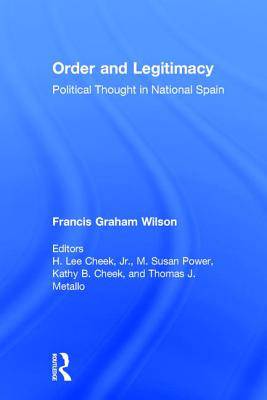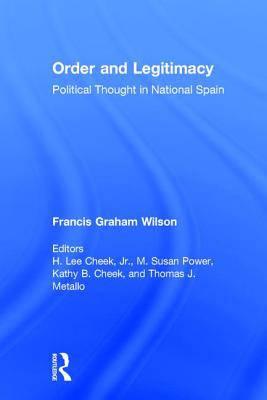
- Afhalen na 1 uur in een winkel met voorraad
- Gratis thuislevering in België vanaf € 30
- Ruim aanbod met 7 miljoen producten
- Afhalen na 1 uur in een winkel met voorraad
- Gratis thuislevering in België vanaf € 30
- Ruim aanbod met 7 miljoen producten
Omschrijving
A growing body of readers is rediscovering Francis Graham Wilson's tremendous contribution to the study of politics and humane learning. In this volume he offers an extensive assessment of the nature of politics and the search for order in Spanish politics, concentrating on the central figures who defended the Church and communities during the Spanish Civil War.
The book argues for the uniqueness of Spain among the other countries of Europe. For Wilson, the most salutary attribute of Spanish politics is found in the assemblage of smaller groupings of the citizenry within the larger society in communities; and it is in the smaller association that the most important aspects of moral, social and political life were nurtured. Part 1 includes assessments of three eminent Spanish traditionalists, Juan Donoso Cortés, Jaime Balmes, and Menéndez Pelayo, as well as studies of central figures from the period of the Spanish Civil War--José Antonio and Ramiro de Maeztu. The final chapters are taken from an unpublished book-length manuscript, "An Anchor in the Latin Mind," that Wilson had completed at the time of his death in 1976, and was recently discovered by the editors.
For Wilson, Latin thinkers possess advantages others do not--a political realism that can be reinvigorated. The recovery of Spanish traditionalism, according to this book, is dependent upon a return to the self-understanding of the ordering principles of Spanish politics and society. Wilson's affirmation of a Spanish traditionalist inheritance during his lifetime encouraged a return to authentic popular rule and a greater appreciation of Spanish achievements in politics and the moral life.
Specificaties
Betrokkenen
- Auteur(s):
- Uitgeverij:
Inhoud
- Aantal bladzijden:
- 210
- Taal:
- Engels
- Reeks:
Eigenschappen
- Productcode (EAN):
- 9780765802453
- Verschijningsdatum:
- 30/06/2004
- Uitvoering:
- Hardcover
- Formaat:
- Genaaid
- Afmetingen:
- 162 mm x 235 mm
- Gewicht:
- 449 g

Alleen bij Standaard Boekhandel
Beoordelingen
We publiceren alleen reviews die voldoen aan de voorwaarden voor reviews. Bekijk onze voorwaarden voor reviews.











